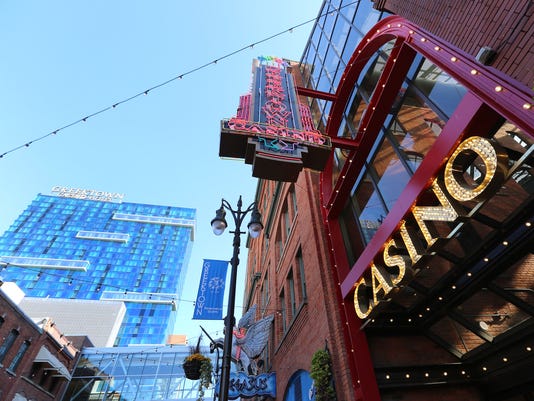
[ad_1]
The $1 billion purchase of Greektown Casino-Hotel by casino operator Penn National Gaming and real estate investment trust VICI Properties will not only usher in a new rewards program for gamblers — but also could heighten competition in the Detroit casino scene, experts said.
For Penn National, the purchase plants a flag in Michigan and a market otherwise split between MGM Grand Detroit and MotorCity Casino Hotel.
Those venues — and the gaming industry as a whole — will be watching closely, said gaming consultants.
“Their portfolio is a good home for Greektown,” said Alex Calderone, managing director of Calderone Advisory Group. “Penn National is a solid operator, with a battle-tested track record.”
New perks, but otherwise business as usual
When the deal closes in mid-2019, gamblers will be rolled into Penn National’s new rewards system. Take note: it allows members to redeem perks in all 40 Penn locations.
That includes benefits at the company’s Tropicana Las Vegas resort for high earners, plus Norwegian Cruise Line discounts and deals. Customers will retain all credits they earned at Greektown for the new program.
Nearby, the company operates the popular Hollywood Casino in Toledo.
But otherwise the company isn’t planning “major” changes on the customer front, said Eric Schippers, senior vice president of public affairs at Penn National. The casino will not be renamed, and restaurants will operate as usual, with no anticipated job cuts across the 1,800-some staff. It remains to be seen how much the property will be renovated.
“It’s going to be, from a customer perspective, business as usual,” Schippers said.
The competitive edge
That doesn’t mean that things will look the same behind the scenes, though.
Greektown is widely considered the third-ranked casino in Detroit, both in terms of revenue and customer opinion. But experts said that it’s unlikely Penn National will try to push Greektown to the top.
For one thing, it’s impossible to change the casino’s location, which is rife with traffic from stadium events and lacks direct highway access, said president of Michigan Consultants Jacob Miklojcik. The casino was also the last to open in Detroit after MGM and MotorCity, Calderone said, and hasn’t been able to build up as much customer loyalty.
“There have been a lot of people that have tried to kind of push it into second or first place from a market perspective, and no one thus far has been successful in doing that,” Calderone said.
But Penn National could still take several routes to expand financially, whether that’s focusing on marketing the hotel to travelers, building up the existing gambler customer base or luring more patrons from further out in Michigan, the experts said.
Schippers said those decisions will be made as the company gets to know the market better.
Penn’s expansive rewards program might also cause other casinos to do a double-take. Although MGM has its own similar program, both it and MotorCity would be wise to consider how their perks stack up.
“That’s a little trickier for MotorCity,” Miklojcik said. “They do cut deals elsewhere, but that may be something for them to ponder.”

A Wheel of Fortune Double Diamond at Greektown Casino-Hotel in Detroit. (Photo: Greektown Casino-Hotel)
The financial picture
A $1 billion price tag sounds like a lot — and it is. But it’s hard to pin down how well Greektown is really doing financially.
The casino’s October total adjusted revenue was $27,604,339.72, as compared to MGM’s $49,780,626.80 and MotorCity’s $38,568,390.35, according to the Michigan Gaming Control Board. Year-over-year, revenue increased by 6.6 percent, up from $25,895,828.06 in 2017.
Revenue alone isn’t enough to know the casino’s bottom line. Still, experts think that Greektown is profitable: As some Detroiters have enjoyed extra cash in recent years, casinos have licked up the benefits.
More:
Dan Gilbert selling Greektown Casino-Hotel for $1 billion
This is what Dan Gilbert owns in Detroit and beyond
Man put $20 in Greektown Casino slot machine, won life-changing amount
“My suspicion is that they’re making money. The gaming industry in general has been propped up by cheap gas, confident consumers, and a fairly strong economy,” Calderone said, adding, “You don’t come to a valuation of a billion dollars with a property that’s not making any money.”
The type of purchasing deal — in which one company will own the property and another will operate it — is part of a growing national trend, Calderone said, that can significantly increase the valuation of gaming and hospitality businesses.
Greektown went through a series of changes since the mid-2000s, not all of them good. The Sault Ste Marie Tribe of Chippewa Indians owned the casino before it went bankrupt in 2008 and investors took over. Businessman Dan Gilbert snapped up the property in early 2013.
Gilbert declined to comment on potential sale of other gaming properties in Cleveland and Cincinnati, as has been rumored, but those in the industry are eager for what could come next.
“Why this property?” Miklojcik said. “Is it just the first one that came together and others will, or he didn’t want to sell the other ones? It’s interesting that this is thus far the only one.”
Read or Share this story: https://www.freep.com/story/news/local/michigan/detroit/2018/11/14/greektown-casino-detroit-penn-national-gaming/1998165002/
Source link
